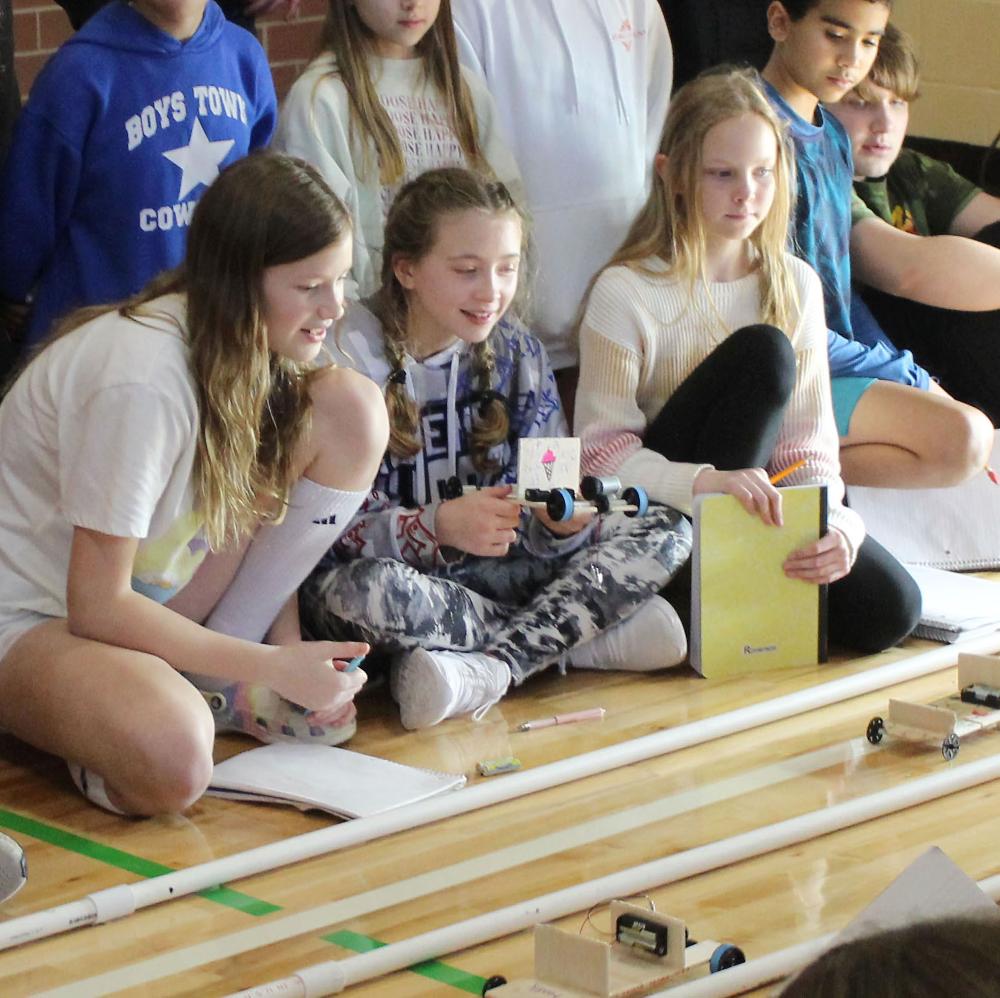Lux students energize their learning by racing solar, electric vehicles
December 13, 2023
Lux Middle School students Paige, Kinley and Stella eagerly watched their racecar fly down a track in the school’s gym Dec. 8.
They were among 150 students who took part in a powerful day of learning in their design thinking class.
Lux teacher Brett Jagels helped them discover scientific principles behind electric vehicles (EV) and solar-powered cars as part of a hands-on project. Sixth-grade students gathered around a 20-foot-long track for 70 minutes of races and research as a part of the Lincoln Electric System’s Solar Car Challenge. They began creating their vehicles Nov. 30 and endured a full week of anticipation leading up to the big day.
“They were excited to start building them,” Jagels said before the races. “They got excited when I talked about racing them against other students in class. They enjoy competing against one another to see who can do the best.”
Jagels gave each team a solar vehicle kit and provided guidelines of what items they could use. The kit featured a rectangular solar panel, one motor, two balsa wood sheets, four nylon spacers, four alligator clips, two axles, four wheels, four rubber bands, two screw eyes, a plastic gear font and a holder for a two-cell AA battery.
Students could choose whether they wanted to power their vehicles with a solar panel or batteries. They could also make alterations such as different shapes or designs. They drew blueprints of what they wanted their cars to look like and began putting them together.
Paige, Kinley and Stella said the project was a good way for them to plug their scientific knowledge into a real-world setting. They called their battery-powered car Scoops Troop and covered it with their names, hearts, a strawberry and a smiling face.
Stella said working together as a group was the best part of the project, and Paige and Kinley said they liked building and decorating the car. All three beamed as they walked back to an empty section of the gym to review how their car did in the day’s first race.
“It was really fun,” Kinley said. “That was cool to do.”
“We had to be careful because the car is fragile,” Paige said. “That was a big thing to think about.”
Mason, Kason and Mehdi also stepped away from the track with smiles. The three friends built a battery-powered car that had two vertical panels on either side. They felt they had learned a lot from the racing project.
“I think it’s been great today,” Mason said. “This has been a really fun experience to get to do this. I’ve really liked being able to hang out with my friends while we were building the car.”
Jason Thomsen said Jagels and other Lincoln Public Schools teachers began working with Lincoln Electric System (LES) in 2022 to develop ways to teach students about energy conversion. Thomsen, who serves as the LPS career and technical education curriculum specialist, said the idea of solar-powered cars popped up first. The group then decided to add electric vehicles (EVs) to the project to give students additional learning opportunities.
Jagels said the partnership with LES has already paid educational dividends. In addition to interactive lessons like the car races, students have also examined many scientific concepts through print and digital means.
“They are learning about how solar energy is harnessed and then used,” Jagels said. “LES has put some good videos together explaining how they use different renewable energy sources in our community. Students are also learning how a vehicle goes, and what the difference between torque and speed are. We have also talked a lot about natural versus artificial light and which one produces more energy.”
McKenzie Ferguson-Fagan is the LES education and outreach specialist. She and other employees of the public power entity engineered a straight track six feet wide and 20 feet long for students. Ultra-bright lighting panels, moveable starting gates and PVC piping were all part of the design.
LES employees tested the three-lane track multiple times before the competition. They wanted to see which configuration of lights would provide the most energy to solar-powered cars. Ferguson-Fagan also brought battery packs for students who entered EVs in the races.
Ferguson-Fagan said it was important for students to gain firsthand knowledge of current and future energy trends.
“Through the LES/LPS solar car curriculum, students can learn real-life applications that go into working as a team to build cars with a renewable source of energy,” Ferguson-Fagan said. “Students are learning the differences between solar and battery power sources, which further educates them on how electricity is stored and used.”
Lux students were the first LPS students to race on the new track. LES staff started setting up the track one hour before the opening race. Students filed through the gym doors right on time and rushed over to see where the action would take place. They filled space on three sides of the track and cheered when cars reached the finish line.
Sadie, Leni and Hazel were among many students who breathed sighs of relief when their cars made it down the path. They smiled when their vehicle finished its journey in 4.01 seconds. Hazel said it was rewarding to see all of the team’s hard work pay off in happy fashion.
“This has been fun to do,” Hazel said. “I think it’s been a really good thing.”
Do you have a story idea? Share it with the LPS Communications Team by filling out this form!
Published: December 13, 2023, Updated: December 13, 2023

From left, Lux Middle School students Stella, Kinley, Paige, Mehdi and Kason watch racecars fly down the track on Dec. 8. Sixth-grade students built solar-powered cars and electric vehicles as part of a unit about energy conversion in their design thinking class. Lincoln Electric System provided the custom-made track for the project.
